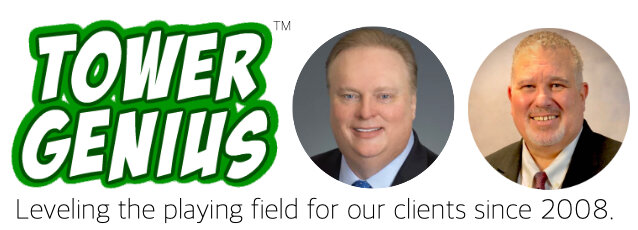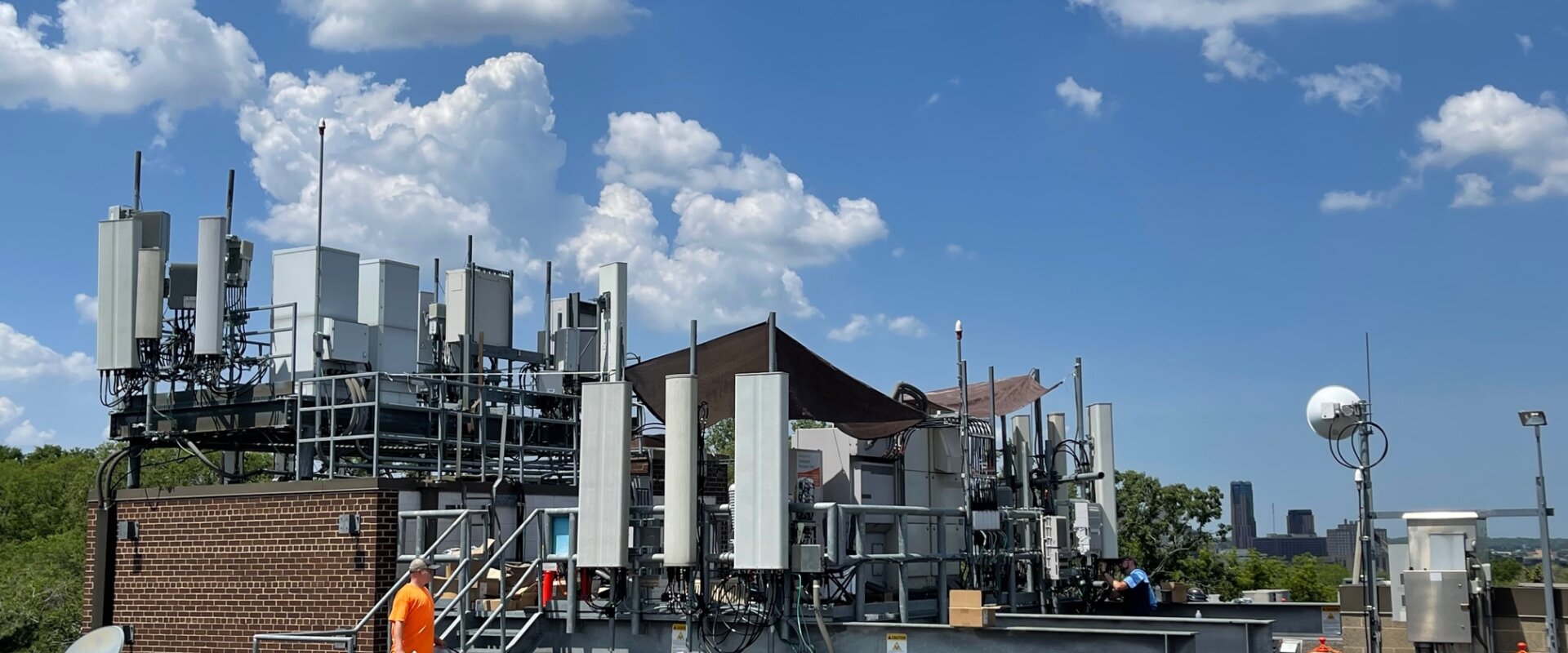All right. How you doing? This is Steve with Tower Genius. Thanks for joining our podcast here, the next episode where we’ll be answering real questions from real people on our real website. And Kevin, why are you chuckling? You think that some of the questions that some of our competitors pose are fake questions from fake people?
Kevin Donohue:
I have my suspicions, yeah.
Steve Kazella:
All right. Let’s see, we’ve got a couple here that been posted recently. Let’s see, I got one about cell tower lease divorce and lease agreement. Let me read this one here. This is Matt from Oklahoma posted question here, says, “Hi, my wife and I are getting a divorce. We have a cell tower T-Mobile lease on our property where we are the husband and wife landowners as described in the lease. I will be refinancing the house in my name and the property title will also be in my name only. Can she be removed from the contract that she will no longer be wife nor landowner? Thanks, Matt.”
Kevin Donohue:
Well, Matt, first of all, I’d like to say I’m sorry to hear you’re going through, that’s a tough situation to deal with and then the financials thrown in just make it more difficult from all the emotional and family stuff, but just the carrier’s not going to remove. If you make a phone call to them, they’re not going to remove the name off of the lease agreement. If you have in your settlement agreement that you have full rights to that cell tower and that property and all revenues generated off of it, that’s something that you can always have. You send over with normal notification letting them know that that third party, your ex-wife, is not going to have any rights where that is concerned, that property and the revenues generated by it are concerned.
And they’ll mark that down the next time when they renew the lease, they’ll actually swap out the name on it, but they will place in that you are now the sole owner and that anything that they deal with will go to you and that she won’t be entitled to gain any information regarding that site at all going forward if that’s what your settlement agreement lays out. And if it doesn’t lay that out, then you need to be very, very, very direct and make sure that your legal counsel writes it in a very clear fashion that they’re entitled to nothing on that property, or at least nothing with that cell tower going forward, whether it’s additional carriers coming in, if you’re getting collocation or if it’s just the regular normal ground lease.
But that would be the answer. Make sure that you’re writing it up in your settlement agreement and that you’re actually then sharing that information, the legal document with the cell tower company. And we find that if you have that notice coming off the desk of your attorney, because you’re usually copying the legal department of the carrier as well, they’ll make sure that it gets noted properly. If you just send it in on your letterhead, somebody’s not paying attention and not working hard that day, they may not actually do what they’re supposed to do. My recommendation is always use your legal counsel to handle that notice for something like that for you to make sure that it’s in the records. Steve Kazella:
Great. Okay, thanks Kevin. And thank you, Matt in Oklahoma. Great question. And hopefully others can benefit from that information as well. All right. Mr. Kevin, let’s go to the next question. Let’s see what we got here. Actually, I’m going to make you blush here. Hold on a second. Let’s see. Okay, I have my second question here. Actually, it’s not a question. It’s a comment for Kevin from Jerry in Oregon, and Jerry is writing about education and advice. That’s the top of his comment and it says here, “Our family has no experience with cell site leasing, but Kevin tactfully provided us with quick education and identified several serious deficiencies in the unsolicited lease agreement, which was presented to us. Kevin is knowledgeable, easy to work with and talks with the layman and plain English. We’re very glad that we found him and he helped us avoid getting stuck in a bad business deal.” From Jerry in Oregon, Kevin, so I thought I’d pass that along to you.
Kevin Donohue:
That’s nice. Jerry was a great guy. He was really wonderful to work with, a real gentleman. It was a situation where they were approached by some folks that were getting some funding I guess, or low interest loans from the government to build out rural towers, but they weren’t exactly being a hundred percent forthcoming on certain things. And they seemed to be talking to the wrong people and making agreements with a lot of folks but the actual landowner. And after we poked some holes in it working with Jerry, I just said to him that he needed to get a few of these questions answered before he went forward using us or whatever. When the questions came in, they weren’t really satisfactory.
We, instead of just taking the deal and churning it like some of our competitors would do and making their commission and not really caring, I couldn’t do that to anybody. I just said, “Look, it’s not worth it for you to get involved in this deal.” And we walked away from our percentage, our payment that we would’ve gotten for assisting them and coaching them. But like I said, it was an honor working with him. He was an absolute gentleman. Yeah, I learned quite a few things from him about that section of the country and all. He’s a great guy. Steve Kazella:
Yeah. Well, excellent. And what do we say? Sometimes the best deal is what? The deal that never [inaudible 00:06:38].
Kevin Donohue:
One you walk away from. Yeah, one that we walk away from.
Steve Kazella:
Yep. Absolutely.
Kevin Donohue:
Sometimes you got to walk away from a deal to get a deal too. You have a strength, the strongest word in the English language is no. And sometimes you just say no, don’t get pushed around and walk away. And then as long as you know where your footing is and how strong your case is and when we’re telling you something, we’ve been doing this longer than anybody. It’s frightening how well we know their thresholds and how far they can be pushed. So how many times have we had it where we’ve told the client, “Look, this isn’t the right deal, walk away.” And then six or eight months later, or a year later, they’re getting a phone call from the same company with their tail between their legs trying to get a deal done.
Steve Kazella:
Hasn’t happened once or twice. It’s happened dozens of time or more.
Kevin Donohue:
All the time. Yeah. I don’t know why the carriers drag it out. They should just, or the tower companies, they should just come to a fair deal and move on.
Steve Kazella:
Yeah. Okay. Well, thanks, Kevin. Let’s move on here. The next question that we have is from JP in NYC. He’s asking about taxes on building rooftop antennas. And JP asks, “Is there a tax on the building that has a roof antenna? If so, is it a sales tax or is it tax on capital tax?”
Kevin Donohue:
Yeah, we’ve seen it done a couple of different ways in New York. That’s why I always tell everybody go to the billing department and ask them how they’re actually calculating your tax. If you put a cell site on your roof and all of a sudden it jumps up, we’ve seen it where it was being done on revenues generated by your leasing, so not your capital gains, but your raw revenue. And then we’ve seen otherwards where it was based on the improvement. We always throw in that however the taxes are based, whether it’s done on a revenue basis or just a construction value basis, that whatever the increase is, that’s due to the carrier’s presence on your property or their improvements, they have to compensate you for that.
And especially in New York and a few other major cities who have similar types of, you know, it seems like throwing a dart and a dart board to figure out how they’re charging you. We always put that into cover a wider base, because in most places it’s based on your construction values, whatever they’re claiming that the improvements are costing and putting in. We first would recommend that you would talk to the folks in New York and figure it out.
But either way, if it’s based due to their presence on that property submitted to there for reimbursement if you have that in your lease agreement, make sure that you’re submitting it because that can end up being a sizeable piece. Also, if it’s a lease that’s been done the last few years, a couple of the carriers put in limitations on what you can charge them after every like 12 months if there’s anything that you have to charge them within that time period, or they don’t owe you that money.
So make sure you’re staying on top of that, especially in a high tax location like New York, because I’m here, I feel your pain. I know what it’s like. But that would be my answer. Make sure you find out how it’s being charged for your specific property and no matter what it is, you can always ask for a letter as if it’s done in a percentage or whatever from the city of New York in their explanation. And then you take that letter and you copy it and submit that copy to the carrier for reimbursement of those taxes that are proportionate to their presence on the property. Steve Kazella:
Great. Thanks for that prospective Kevin and I tell property owners all the time that the devil is in the details in these lease agreements. You could have a great lease rate, have a horrible agreement and the tax language is just one of those dozens of modifications that need to be considered in these agreements because they’re so grossly one sided.
Kevin Donohue:
How many landlords have we seen that where we laid out for them over 30 years what they were missing out by charging two points less in increases, every annual increases, but they took an extra $200 up front every month. And then they realized that at one point they were making less and then it started to snowball. They all get that sick look on their face when you’re talking to them.
Steve Kazella:
Yeah. The leasing reps are highly incentivized to get you the worst deal possible. That’s really what it comes down to. All right, thank you JP in New York City. Thank you Kevin for your feedback. And this is the end of this installment of the Tower Genius Podcast. And thank you for watching and hopefully we’ll see you soon. Adios.


